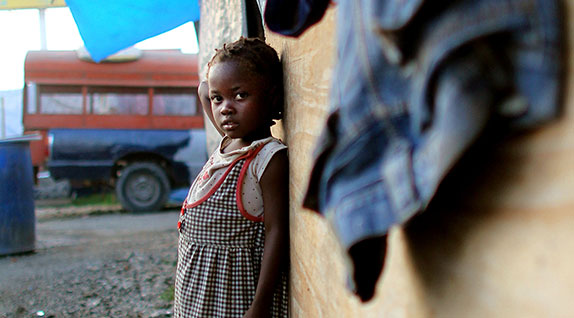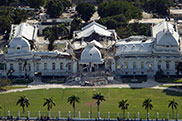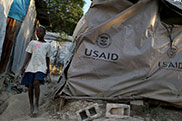 Mario Tama/Getty Images
Mario Tama/Getty Images
Article
Despite the nation’s roiling problems five years after a devastating earthquake, the people of Haiti do have a promising future.
Learn the why behind the headlines.
Subscribe to the Real Truth for FREE news and analysis.
Subscribe Now“Stroll in her hills, meet her people, listen to her music, bathe in her rivers and seas and smile because, in spite of her trials and tribulations, Haiti is smiling at you.”
These are the words “Destination Haiti,” a Haitian travel company, prints on banners that beckon foreigners to visit. It is a scene few associate with the beleaguered nation.
Many still think back to the devastating earthquake that occurred on January 12, 2010. They think of the cement roofs of makeshift homes collapsing on tens of thousands of people in Port-au-Prince. They think of rows of neighborhoods turned into stone heaps, 80,000 people still living in tents, and nearly three-quarters of the city’s residents living in slums with no building codes or sewage systems. They think of the collapsed presidential palace—once the crown jewel of the city’s government district—which was later deemed unrepairable and demolished after years of reconstruction attempts.
Others will recall the cholera epidemic that broke out nine months after the quake that continues to infect hundreds each week. According to the World Health Organization, as of December 2014, there was a total of 717,203 cases—resulting in 8,721 deaths—the most of any country in the world.
With these scenes lingering in people’s minds, luring visitors with a “new image and new message,” as Haiti’s Tourism Minister Stephanie Villedrouin put it, can seem like a stretch.
Yet the rebranded view is strategic. Currently, half of Haiti’s governmental budget comes from international economic assistance. In addition, non-profit groups have poured money into the nation for years.
These income streams, however, are unsustainable: “Humanitarian aid is petering out as agencies leave and money dries up. The decline means Haiti’s partners should be stepping up development efforts, to put the country on a sustainable recovery path, but that isn’t happening,” The New York Times reported four years after the quake.
In 2010, reports and images of the scale of the earthquake’s destruction spurred $13.5 billion in pledges from private charities and national governments. Hundreds of relief organizations flocked to the country, providing food, water, medical supplies, and services to sustain the crippled populace.
Gael Turine, a freelance documentary photographer who spent 10 years of his career on the island, told Time that “there’s never been a situation when such a small country has been the target of such a massive influx of money and assistance in such a short span of time…On paper, with that much money in a territory the size of Haiti, we should have witnessed miracles; there should have been results.”
Even as the fifth anniversary of the earthquake passed, conditions for Haitians remain troubling. The Economist called this year’s remembrance of the earthquake an “unhappy anniversary” and described the problems it continues to face.
 Logan Abassi/cc by 2.0/U.N. Development Program
Logan Abassi/cc by 2.0/U.N. Development Program“…many who have found new [habitations] live in ramshackle temporary developments sprawling up hillsides…Despite international promises to help Haiti build better governing institutions, municipal and parliamentary elections are three years overdue…aid has been dwindling for three years and is now drying up. Some of this is because of donor fatigue and pressing demands elsewhere…almost a quarter of the population earns less than $1.24 a day, the threshold of absolute poverty.”
Despite continued incredible national problems, Haitians press on. Mr. Turine noted: “It’s already a victory to see that the country hasn’t exploded…The fact that Haitians haven’t succumbed to madness shows that they’re resilient.”
Those in Haiti have no choice but to take each day as it comes and tackle one problem at a time.
Longstanding Problems
To put Haiti’s troubles in perspective, it helps to examine another major earthquake that happened around the same time.
Architect Paul Fallon wrote in an article for Boston’s NPR news station WBUR: “A month after the Haiti disaster, Chile experienced an 8.8 magnitude earthquake that claimed 523 lives, a count as precise as Chile’s stringent building codes. The comparative math from these two events is staggering: Chile’s earthquake was 60 times more powerful than Haiti’s, yet Haiti suffered 500 times more deaths…shoddy building construction was responsible for most earthquake-related deaths. Haiti’s long tradition of concrete construction, excellent at supporting direct pressure but weak if pulled or shaken, exacerbated the tragedy. Concrete requires steel reinforcing to withstand forces from all directions, but steel is expensive, and building codes are nonexistent in Haiti. Insufficiently reinforced concrete crumbled when the earth shook. People were crushed.”
 Joe Raedle/Getty Images
Joe Raedle/Getty Images Though Haiti’s government does have building codes in place, lack of ability to address and enforce them has rendered them null.
And it is not just infrastructure. Political disorganization has prevented Haiti’s government from obtaining the resources needed to provide for its people, whether educationally, economically or otherwise. This has been the case both before and after the temblor.
There is a reason behind the constant turmoil. In its colonial era, the people of Haiti endured Spanish and then French rule from the 15th to the 18th century. Eventually, nearly 500,000 slaves rose up against brutish slave-owners, which developed into a colony-wide uprising in 1791. After 13 years of fighting, Haiti declared independence in 1804 and became the first independent state in the Caribbean.
Dreams of creating a republic modeled after the United States vanished after its first ruler, revolutionary hero Jean-Jacques Dessalines, declared himself emperor for life. Two years later, his own advisers assassinated him, splitting the nation into two factions—a southern republic and a northern monarchy.
The leader of the republic soon declared himself president for life. The two halves later reunited after King Henri I of northern Haiti committed suicide over a looming coup d’etat.
The nation’s history is a continuous cycle: a new leader steps into office, takes advantage of power, people revolt, political chaos ensues, a hero steps in and instigates a revolution…
Throughout Haiti’s over 200-year history, 23 constitutions have been signed. Also, it has experienced nearly every form of government—dictatorship, republic, democracy, military regime—and even periods of time without one.
Today, the political instability continues. Haiti was slated to hold legislative elections on January 12, 2012. Yet, “With elections delayed for more than three years, Haiti…has no elected mayors, no elected community representatives. The terms of a second-tier of the 30-member Senate [have] expired, leaving only 10 Senators. The entire 99-member Chamber of Deputies also left before it could approve the new prime minister or government,” Reuters reported.
An NPR article added that on a weekend in the first half of January “demonstrators marched in the streets, sometimes clashing with police, as lawmakers met late into the night hoping to avert a political crisis and schedule long-overdue elections. Without an agreement, the terms of a majority of lawmakers [expired]—leaving only the president left to rule legally, a troubling echo of Haiti’s dictatorial past.”
Later in the month, a new consensus government was formed, but leaders opposed to the current Haitian president feel he is using the crisis to promote the candidate he wants to succeed him.
Such political turmoil is a major reason why the pledged $13.5 billion in aid has done little to bolster the Caribbean nation, as the Miami Herald noted.
 Joe Raedle/Getty Images
Joe Raedle/Getty Images“Five years after Haiti’s devastating Jan. 12, 2010 earthquake, which saw millions of dollars in foreign debt forgiven, Haiti is once again deep in debt…Instead of achieving its projected 4.8 percent growth at the end of 2014, Haiti achieved 2.8 percent.”
Despite both time and massive sums of money, Haiti still ranks high on the human misery index. A reporter for the Chicago Tribune stated: “On the United Nations human development index—a composite measure of length and quality of life—Haiti ranks 168 out of 187 countries, putting it squarely between Sudan and Afghanistan.
“And Haiti’s only a two-hour flight from Miami.”
World Forgets
Haiti’s fade back into obscurity was noted by The New York Times: “Haiti is a fragile, largely forgotten country. It’s possible that some natural or man-made crisis this year could push it back into the headlines. But sustained attention, with the kind of support from outside that Haiti still needs to rebuild and become more self-sufficient, is mostly gone.”
While no one wants continued suffering, part of the reason for a lack of attention is the sheer number of tragic events occurring elsewhere.
Each subsequent crisis the world encounters shifts its focus further from Haiti. In March 2011, Japan was struck by an 8.9-magnitude earthquake, causing a tsunami that killed over 15,000. On top of that, a nuclear facility was damaged and the world had to rush to avert a possible nuclear meltdown.
Throughout 2012, floods from monsoons displaced over 32 million people worldwide. Lives hung in the balance. Typhoon Haiyan struck the Philippines in 2013, destroying roads, sanitation systems, and food sources. The 3.6 million people who were displaced needed shelter, food and medical attention immediately.
With natural and manmade disasters, the most recent ones take priority in people’s minds. A front-page news story is often barely reported on later. For example, villages are still being destroyed and citizens attacked in Darfur, Sudan. Hyper-inflation, sky-high unemployment rates, and starvation still plague Zimbabwe. Even the little-known territory of Western Sahara continues to endure a 30-year civil conflict between two factions claiming control. Both have been criticized for human rights violations.
 Hector Retamal/AFP/Getty Images
Hector Retamal/AFP/Getty Images The constant deluge of both immediate crises and lingering ones makes it impossible for the globe to address each one.
Failure of Human Governance
Man has demonstrated an inability, despite his best efforts and good intentions, to bring lasting solutions to certain nation-states. This is especially seen in regions that have marginal or weak governments. Pouring a significant amount of aid and other resources into these areas has proven to be ineffective—and even counterproductive.
In reality, however, nearly every nation is struggling with the same difficulties. Whether it is poverty, lack of food and clean water, inadequate housing, crumbling infrastructure, political unrest, or the like, these challenges preoccupy all peoples to one degree or another.
In fact, these can really be categorized as human problems as they are more commonplace than most realize.
Far too many nations are teetering on disaster. Yet their problems are only brought to the fore when a calamity such as Haiti’s earthquake strikes. It is then that people acknowledge long-standing issues, at least temporarily, only to move on after a time. Regrettably, these difficulties do not simply go away once the headlines disappear.
Why are human leaders, some of them seemingly accomplished and brilliant, unable to bring lasting positive results to those they lead? Why in this modern age is man unable to permanently fix problems such as the lack of food or potable water for everyone, and create and sustain peace?
Various humanly guided approaches to governance—whether through communism, socialism, monarchies, dictatorships and democracies—seem to last for a time yet inevitably fail. After thousands of years of trial and error, why is nothing working?
It is because something vital is missing.
Essential to leadership in general is the requirement for a leader to guide those who follow toward a certain end or goal. Whether leading a company or a country, a good leader must have a firm grasp on a specific destination and the proper course of action to make it there.
This presents a colossal problem when it comes to man leading himself. On his own, man has no clue where he is going or how to get there!
Consider the following from the Bible: “O Lord, I know that the way of man is not in himself: it is not in man that walks to direct his steps” (Jer. 10:23). Gesenius’ Hebrew-Chaldee Lexicon to the Old Testament defines the word “way” as “road,” “distance,” “journey,” “manner,” “habit” and “course of life.”
Come to grips with what this verse is saying. Man is unable to “direct his steps” or guide himself—even those who lead nations. In fact, the ability to do so is not even in him! This is why his ways, however brilliant and thought through, ultimately do not work. He is only looking within himself for solutions.
Does this mean mankind is doomed to fail with no hope of future success?
Far from it! The point is that instead of looking within for answers to life’s issues, man must first admit he does not have all the answers. Once this is done, he must then look to someone greater than himself to achieve lasting success.
Notice who is aware of the way man should go: “Man’s goings are of the Lord; how can a man then understand his own way?” (Prov. 20:24).
This verse begins with a statement and is followed by a question to which the answer should be clear: The way of man is not in himself and God knows the way he should go. Mankind must look to its Creator for guidance.
For all the millennia of human existence, man has done “that which was right in his own eyes” (Judges 21:25). Because of this, lasting peace, joy, security, prosperity and sense of purpose elude mankind.
Hope for All Nations
Unknown to most, an awesome future lies just ahead for the people of Haiti—and all nations. The lack of proper leadership that has plagued men’s governments will soon be addressed. Filling this void is of such crucial importance that it is the central message of the Bible. It is the gospel—or good news—of the coming kingdom of God.
“Kingdom” is another word for government. Notice how vital the execution of proper government is in this well-known prophecy about Jesus Christ’s Second Coming: “For unto us a Child is born, unto us a Son is given: and the government shall be upon His shoulder: and His name shall be called Wonderful, Counsellor, The mighty God, The everlasting Father, The Prince of Peace” (Isa. 9:6).
Most focus on the various titles given to Jesus Christ in the verse. Yet realize this look ahead also reveals that He will shoulder the burden of government—a burden men have yet to properly bear.
Christ’s future role is further highlighted in Jeremiah: “Behold, the days come, says the Lord, that I will raise unto David a righteous Branch, and a King shall reign and prosper, and shall execute judgment and justice in the earth” (23:5). As ruler of Earth’s government, Christ will execute righteous judgment and justice, and the entire world will prosper.
Under this government the Bible makes clear that the world will be significantly different. Instead of the turmoil and strife that is so common today, Christ, along with those assisting Him, will bring peace and prosperity.
The extent of these coming changes are highlighted throughout Scripture. One notable place is Micah 4: “But in the last days it shall come to pass, that the mountain of the house of the Lord shall be established in the top of the mountains, and it shall be exalted above the hills; and people shall flow unto it. And many nations shall come, and say, Come, and let us go up to the mountain of the Lord, and to the house of the God of Jacob; and He will teach us of His ways, and we will walk in His paths: for the law shall go forth of Zion, and the word of the Lord from Jerusalem. And He shall judge among many people, and rebuke strong nations afar off; and they shall beat their swords into plowshares, and their spears into pruninghooks: nation shall not lift up a sword against nation, neither shall they learn war any more. But they shall sit every man under his vine and under his fig tree; and none shall make them afraid: for the mouth of the Lord of hosts has spoken it” (vs. 1-4).
This is one of several biblical references that speaks to a more desirable world—one with proper and unified government, religious unity, no more war, and economic prosperity on an individual basis. Consider all the related implications that go along with a change in these areas.
The following excerpts from the book Tomorrow’s Wonderful World – An Inside View! written by David C. Pack, publisher and editor-in-chief of this magazine, further address this coming world-ruling government. The volume contains specific Scripture-based details of how the entire world will prosper under Christ’s guidance.
- Right government: “The very gospel message that Jesus Christ brought is almost entirely about government. But this gospel—the good news of the kingdom of God—is almost entirely unknown to popular, traditional Christianity. Men have never wanted God’s—or any other—government over them. Most have no idea that the Bible is primarily a book about government—why men’s governments never work, and why God’s pattern is the only one that does!”
- Cities of tomorrow: “City planners of the future will always be certain to allow enough room for people to enjoy their homes and the land around them. But the planning of this world’s cities has been much different. Overpopulation has translated into over-crowding, with tenement houses teeming with too many people for the space allotted…(Isa. 5:8). The cities of the world to come will present a far different—and infinitely better and more beautiful—picture than the cities of today.”
- Health: “Man is feverishly seeking to conquer disease. Yet he falls further and further behind—as he seems to control one disease, two more appear.
“This will all soon change. All man’s efforts to cure diabetes, arthritis, cancer, heart disease, blindness, deafness, Alzheimer’s (and other diseases of the mind), strokes, AIDS, and a host of infant and childhood diseases will soon be unnecessary. All of the ongoing searches for new wonder drugs, treatments, specialized diagnoses, surgeries and procedures, advancements in technology—and every other kind of medical advancement—will soon be called off.”
“Through proper re-education of the world, God’s laws of health will become known—and compliance with them will become practical and affordable.”
- Economy: “To survive in today’s hostile world, governments must collect exorbitant rates of taxation to finance military forces and expanded law enforcement personnel. Of course, greed on the part of many government leaders accounts for much of the excess taxation that is now so burdensome to so many…Outrageous tax rates will be eliminated.
“The administration of God’s government has costs, however. Rather than tax rates ranging from 30 to 90 percent, a tithe—just 10 percent!—will be required. That 10 percent belongs to God (Lev. 27:30).”
“Most nations have a variety of heavy, burdensome, hidden taxes, and national health and social security services. Ever-mounting taxes become overwhelming to many now struggling to survive. These burdens will be lifted in tomorrow’s world.”
- Education: “Life is a process of education—learning to develop character by obedience to God’s laws, which in turn yields every good, fulfilling, and favorable result. Education in the world tomorrow will explain how to live—and how to learn a productive trade. Of course, all academic subjects, including wholesome art and music, will produce well-rounded people. Life will become invigorating, exciting, and fulfilling.”
“Re-educating the world will be a truly monumental task. The difficult job of teaching people to learn can only be done if teachers are un-handcuffed and allowed to bring proper discipline and order to schools and classrooms, now so out of control.”
(For more detail and insight on what is to come, read Mr. Pack’s life-changing book at Tomorrow’s Wonderful World – An Inside View!)
All of this points to a promising future for the Haitian people. Under Christ’s direction, rulers will have benevolent motives, seeking and ensuring the welfare of the people. They will lead citizens in rebuilding cities that consist of sturdy homes—all reflecting elegance, quality and efficiency.
God’s involvement, along with proper sanitation and healthy lifestyles, will help make diseases like cholera issues of the past. There will be no need to rely on foreign income as the nation’s economy will be self-sufficient and thrive.
Through proper education, Haitians—and those of all nations—will learn how to lead productive lives. All peoples will be happy and reap the bounty that this way of life affords.
Though the immediate future for Haiti and the entire world is filled with challenges, hope remains. Man has yet to solve his ever-growing list of problems, but a coming King can—and will!
The flawed governments of this modern age clearly do not work. But mankind’s ways will soon be supplanted. They will be replaced by something far better—a perfect world-ruling supergovernment— that will truly provide a bright future for Haiti and the rest of the world!
More on Related Topics:
- As U.S. Block of Oil Supply Deepens Energy Crisis, Cubans Ask: What More Can We Sacrifice?
- Egypt’s Drone Deployment to Border Raises Stakes in Sudan’s Civil War
- Atomic Scientists Set ‘Doomsday Clock’ Closer to Midnight Than Ever
- U.S. Seizes Russian-Flagged Tanker Tied to Venezuela as Trump Widens Oil Push
- President Trump Threatens Iran Over Protest Crackdown as Deadly Unrest Flares


